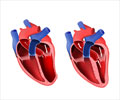Q: Who performs an exercise stress test?
A: An exercise stress test is usually ordered by a General Physician or a Cardiologist. It is performed by a doctor and/or trained technician.
Q: Is there any risk associated with an exercise stress test?
A: Stress tests are generally safe. However, rarely patients may faint, develop chest pain or collapse. Heart attacks or dangerous arrhythmias are further rarer. People already known to have weak hearts are not given this test.
Q: Is there a limitation for this test? Or is it perfectly accurate?
A: The accuracy of a stress test in young or middle-aged women with symptoms that are not typical of heart disease has been found to be low.
Q: What if I have taken Viagra in the past 24 hours and I have to take the stress test?
A: Notify your doctor. This is because if you have taken the drug, dangerous side effects like drastic drop of blood pressure may occur, especially when a drug called nitroglycerin is required to relieve chest pain during the test.
Q: Are there other types of stress tests?
A: The different types of stress tests are:
Treadmill stress test: This is the commonly performed test that is described above.
Dobutamine or Adenosine Stress Test: This is for patients who cannot exercise. Instead of exercising, the patient is given drugs that evoke response in the heart.
Stress echocardiogram: Performed similar to the exercise stress test. It provides finer details about blood flow to the heart.
Q: Can patients who cannot exercise take the exercise stress test?
A: There is a Dobutamine or Adenosine Stress Test for patients who cannot exercise. Drugs are used to evoke the same effect that exercise produces in the heart.
 MEDINDIA
MEDINDIA
 Email
Email




